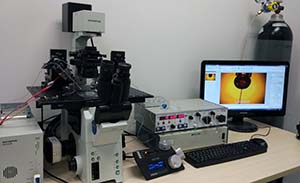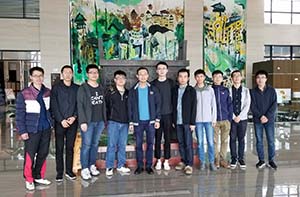The University of Macau (UM) has achieved another breakthrough in scientific research. In the latest research project from the Department of Electromechanical Engineering, Faculty of Science and Technology (FST), University of Macau (UM), titled ‘Force-Sensing Automated Micromanipulation System’, force-sensing microinjectors and microgrippers have been developed towards automated operation on a micro and nanometer scale. The invented equipment enables a high survival rate for the injected cell as the cells suffer from minimum force during the injection process. The equipment will also produce more consistent and reliable results than skilled manual operation, and can significantly reduce the workload of, and dependence on the experience of, human operators. The project has been recommended for the Technological Invention Award (Second Prize) of the 2018 Macao Science and Technology Awards.
The research project was led by Xu Qingsong, an associate professor from the FST. The automated micromanipulation systems refer to robotic devices that can manipulate tiny objects automatically on a micro/nanometre scale. They are demanding and peering devices for modern precision engineering applications, including micro/nano manufacturing, biomedical engineering, and IC packaging. In line with the development trend of robotics and biomedical science and technology, this project has achieved technological innovations and breakthroughs in micromanipulation robotics, leading to new and extremely attractive application modes. As a frontier microinjection device, the invented force-sensing microinjector enables significant improvement on the consistency and viability of the injected cells and will cater to the growing demand for manipulating living cells in biomedical engineering. Meanwhile, novel intelligent robust precision motion control and hybrid position/force control algorithms have been invented to improve manipulation accuracy and speed. The newly developed systems have a lower cost of hardware compared to existing commercial products.
Prof Xu is a technical editor of IEEE/ASME Transactions on Mechatronics and an associate editor of several other journals. He has published three monographs and over 240 papers in international journals and at international conferences, and has received nine patents in China and the United States. According to the citation report of Web of Science from Clarivate Analytics, his H-index is 31, with a citation frequency of over 2700. Prof Xu’s main research interests include micro/nano-mechatronics and systems, robotics and automation, smart materials and structures, and intelligent control.
澳門大學科研又一突破!澳大科技學院機電工程系的最新研發“力傳感自動化微操作系統”,能夠自動在微納米尺度上操縱“微注射器"和“微夾鉗",使細胞在注射過程中只受到最微小的力,大大增加細胞被微注射後的存活率,也大大減少對操作人員人手經驗的依賴及工作量,令微注射效果更為穩定和可靠。該機械人裝置項目,獲推薦頒授2018年 “澳門科學技術獎技術發明獎(二等獎)”。
該研究項目由澳大科技學院副教授徐青松帶領團隊進行研發,其自動化微操作系統,是微操作機器人領域的一項技術創新及突破,集微納米科技、生物醫學工程和集成電路芯片的先進精密技術打造而成,能在微納米尺度上自動操縱微小物體,迎合機械人技術與生物醫學科技有機結合的發展趨勢,具極具吸引力的新用途。該研發能顯著改善注射後細胞的穩定性及存活率,能滿足生物醫學工程中對活體細胞操作的不斷提升的需求;同時,研究團隊也發明了新型、智能耐用的精確運動控制裝置,以及位置與力度混合控制算法,並應用於新研發系統,以提高操作精準度和速度。此外,與市面同類產品相比,新研發系統製作成本相對較低。
徐青松為國際知名刊物《IEEE/ASME機電一體化會刊》技術編輯,曾出版三部著作,並在國際期刊及會議發表論文逾240篇,在中國及美國獲得9項研發專利。據科睿唯安Web of Science,徐青松的H指數為31,論文引用次數超過2700次。其主要研究領域包括微/納機電一體化系統、機器人和自動化、智能材料與結構、智能控制等。

UM’s research project titled ‘Force-Sensing Automated Micromanipulation System’
澳大最新研發“力傳感自動化微操作系統”

A group photo
合影

